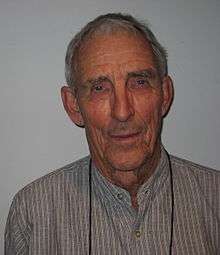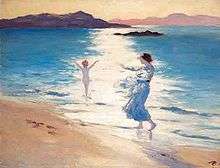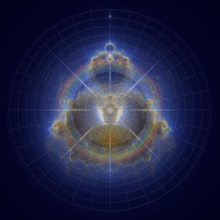Peter Matthiessen (22 May 1927 – 5 April 2014) was an American novelist, naturalist, wilderness writer, zen teacher and CIA agent. A co-founder of the literary magazine The Paris Review, he is the only writer to have won the National Book Award in both fiction and nonfiction.
Quotes
The Snow Leopard (1978)
- Amazingly, we take for granted that instinct for survival, fear of death, must separate us from the happiness of pure and uninterpreted experience, in which body, mind, and nature are the same. And this debasement of our vision, the retreat from wonder, the backing away like lobsters into safe crannies, the desperate instinct that our life passes unlived, is reflected in proliferation without joy, corrosive money rot, the gross befouling of the earth and air and water from which we came.
- "October 5", p. 42
- The progress of the sciences toward theories of fundamental unity, cosmic symmetry (as in the unified field theory) — how do such theories differ, in the end, from that unity which Plato called “unspeakable” and “indiscribable,” the holistic knowledge shared by so many peoples of the earth, Christians included, before the advent of the industrial revolution made new barbarians of the peoples of the West? In the United States, before spiritualist foolishness at the end of the last century confused mysticism with “the occult” and tarnished both, William James wrote a master work of metaphysics; Emerson spoke of “the wise silence, the universal beauty, to which every part and particle is equally related, the eternal One . . .”; Melville referred to “that profound silence, that only voice of God”; Walt Whitman celebrated the most ancient secret, that no God could be found “more divine than yourself.” And then, almost everywhere, a clear and subtle illumination that lent magnificence to life and peace to death was overwhelmed in the hard glare of technology. Yet that light is always present, like the stars of noon. Man must perceive it if he is to transcend his fear of meaningless, for no amount of “progress” can take its place. We have outsmarted ourselves, like greedy monkeys, and now we are full of dread.
- "October 9", p. 62
- The ancient intuition that all matter, all “reality,” is energy, that all phenomena, including time and space, are mere crystallizations of mind, is an idea with which few physicists have quarreled since the theory of relativity first called into question the separate identities of energy and matter. Today most scientists would agree with the ancient Hindus that nothing exists or is destroyed, things merely change shape or form; that matter is insubstantial in origin, a temporary aggregate of the pervasive energy that animates the electron. … The cosmic radiation that is thought to come from the explosion of creation strikes the earth with equal intensity from all directions, which suggests either that the earth is at the center of the universe, as in our innocence we once supposed, or that the known universe has no center. Such an idea holds no terror for mystics; in the mystical vision, the universe, its center, and its origins are simultaneous, all around us, all within us, and all One.
- "October 9", p. 65
- In another life — this isn’t what I know, but how I feel — these mountains were my home; there is a rising of forgotten knowledge, like a spring from hidden aquifers under the earth. To glimpse one’s own true nature is a kind of homegoing, to a place East of the Sun, West of the Moon — the homegoing that needs no home, like that waterfall on the upper Suli Gad that turns to mist before touching the earth and rises once again into the sky.
- "November 11", p. 232
Nine-Headed Dragon River: Zen Journals 1969-1982 (1986)
- When we are mired in the relative world, never lifting our gaze to the mystery, our life is stunted, incomplete; we are filled with yearning for that paradise that is lost when, as young children, we replace it with words and ideas and abstractions — such as merit, such as past, present, and future — our direct, spontaneous experience of the thing itself, in the beauty and precision of this present moment. We identify, label, and interpret our surroundings as abstract concepts, quite separate from another concept, which is our own separate identity and ego.
The Paris Review interview (1999)
- "Peter Matthiesse, The Art of Fiction No. 157" interview by Howard Norman, in The Paris Review (Spring 1999)
- I am a writer. A fiction writer who also writes nonfiction on behalf of social and environmental causes or journals about expeditions to wild places. I have written more books of nonfiction because my fiction is an exploratory process — not laborious, merely long and slow and getting slower.
- Many great writers inspired me, of course, but inspiration is not the same as a direct influence. I was often stirred by the beauty of great prose, the passion and startling intensity of hard-won truths, which leapt from that creative fire. … For the writer, therefore the reader, fresh truth is exhilarating, even painful truth, as in Kafka or Céline. Isn’t that what good writing finally arrives at? The insights and epigrams of Alexander Pope weren’t clichés when he wrote them, any more than those resounding lines in Shakespeare. They only became dog-eared from overuse.
- I rarely go back to a book, since I never feel sufficiently caught up in my own work. However, a few years ago, on a stalled expedition, I had an opportunity to reread The Idiot, which I’ve always thought of as “my favorite novel” (if such a thing can be; the great ones are no more comparable than the sun and the sky). I wanted to see if that book held up — if it was as heartbreaking and magnificent as I once thought it, and of course it was. Whereas — well, let’s simply say that most modern novels, even the better ones, are pretty dinky in ambition and certainly unworthy of a second reading when one knows that great ones are still out there unread. … I admire many of my contemporaries, especially those who risk something or bring some new element to their work. … Of course, there are single novels that are excellent, but what interests me most is the working through from book to book of some recurrent obsession or at least preoccupation, a reverberation from within, which may burst the work wide at any moment, though it often seems half-hidden from the writer. What I’m trying to describe, I guess, is conflagration, a life burning up, as lives do in Dostoyevsky. Obsession that isn’t crazed or criminal is always enthralling.
Quotes about Matthiessen
- Peter Matthiessen’s writing — fiction and nonfiction — does not provide approximations. What it does do with inimitable skill is put a reader at the live heart of life — a powerful, rich sense of immediacy, of being in that moment. … He is a man of tough-minded opinion, deeply earned and forthrightly rendered, with passion and quick humor ringed with what one writer calls a "useful melancholy." … There is, to my mind, no writing life more vital and of greater distinction in the second half of our century. Matthiessen’s prodigious and varied works led William Styron to call him "an original and powerful artist . . . who has produced as distinguished a body of work as any writer of our time . . . He has immeasurably enlarged our consciousness."
External links
- "Peter Matthiesse, The Art of Fiction No. 157" interview by Howard Norman, in The Paris Review (Spring 1999)
- Peter Matthiessen interviewed on Conversations from Penn State
- Interviewed on The Charlie Rose Show (27 May 2008)
- "Are 3 Novels, Revised as One, a New Book?" by Charles McGrath, in The New York Times (11 November 2008)
- Time Passes (2011), a film portrait of Peter Matthiessen by Pat van Boeckel broadcast in the Netherlands by the Buddhist Broadcasting Foundation (Part 2 and 3 can be viewed at the same website)
- Works by or about Peter Matthiessen in libraries (WorldCat catalog)
- "Remembering writer Peter Matthiessen", PBS News Hour (7 April 2014)
This article is issued from
Wikiquote.
The text is licensed under Creative
Commons - Attribution - Sharealike.
Additional terms may apply for the media files.


